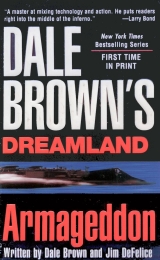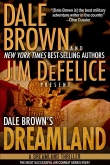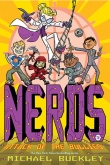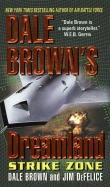
Текст книги "Armageddon"
Автор книги: Dale Brown
Жанр:
Боевики
сообщить о нарушении
Текущая страница: 11 (всего у книги 20 страниц)
“All right,” he told the crew. “Let’s take a deep breath.”
He and the copilot ran through the computer’s screens, double-checking the damage. Besides the engine, there had been some light damage to the control surfaces on the right wing. But it wasn’t too severe; the plane remained eminently controllable and they were climbing at a decent pace.
“Time to head back for the barn,” Mack told his tired crew. But as he brought up the screen to plot a course home, they reported an odd contact on the surface of the water, heading at high speed toward the Brunei oil derricks.
“Range, twenty miles, almost directly ahead,” said Jalan. “Computer can’t identify it, but it’s doing at least fifty knots” It was almost directly ahead.
“Let’s have a look,” said Mack.
Off the coast of Brunei
0844
Dazhou Ti folded his arms as they approached the oil platforms. He planned on drawing to within a mile before firing. The target was unarmed, and destroying it would be child’s play. The fact that the shells from the Barracuda’s gun were only twenty-five millimeters meant that they would have slightly more time to practice their marksmanship.
“Sixty seconds to firing point,” announced the weapons officer. “Steady,” said Dazhou Ti.
“Captain, the aircraft we noted earlier is tracking us,” said the radar operator.
“How can that be?” Dazhou moved over to the radar station, where the indicator showed that they were indeed visible on the airplane’s radar. It was the American Megafortress that had been given to the enemy.
General Udara had promised that their spies and radar would keep track of the aircraft, and that if necessary the Malaysian air force’s two Sukhoi Su-27s would distract it—or. if the opportunity presented itself, shoot it down. But obviously the Megafortress had managed to slip by them.
Imbeciles.
“Prepare the anti-aircraft missiles,” said Dazhou Ti. “Stay on the course but lower our speed. If they come close enough, we will make them very sorry.”
Aboard Jersey, off the coast of Brunei
0848
The ship—if that’s what it was—looked like a black triangle with wings on the surface of the ocean ahead, a metal loon that was aimed like an arrow at the Brunei oil field. And it moved incredibly fast—around a hundred knots.
“I’ll bet that’s what sunk the merchant ship the other day,” Mack told Jalan. “Probably hit the oil tank as well.”
“I can alert the navy,” said Jala. .
“Yeah,” said Mack, looking at the image in the enhanced video. He wasn’t much of an expert on naval architecture, but the craft looked as if it used something similar to wing-inground effect, skimming over the surface of the water like an airplane at very high speed. The sharp, odd angles would also make it hard to spot for most radars, even the EB-52s. except at close range. The black paint made it hard to see.
During the nighttime, that is. They must be feeling their oats to operate during the day.
The nearest oil platform was only a few miles away. It’d be easy pickings for a missile or even a gun attack.
“Not getting an acknowledgment from the navy,” said Jalan.
“Get our ground control and give them the coordinates,” said Mack. “See who’s on alert—Dragonflies could probably take out that piece of tin with a couple of 250-pound bombs.”
“Minister—the vessel is targeting us with its radar,” said Jalan. “Its roof is opening”
Mack cursed as he realized what the strange craft was up to. By the time he leaned on the throttle the ship had launched two missiles at them. Mack fired off the last of his flares and poured on the dinosaurs, his heart pounding as the flat-footed Mega-fortress tried to pick up momentum against the SA-14s, small Russian heat-seekers similar to the American Stinger shoulder-launched anti-air missile. The weapons had a very limited range and small warheads; even so, the Megafortress’s tail caught some shrapnel as one of the warheads exploded.
Which really pissed Mack off.
As he banked back, he told Jalan to open up the bomb bay. “Minister?”
“Do it, Jalan.”
“Yes, sir.”
“Give me the air-to-ground attack mode, standard bomb program one.”
The Megafortress’s computer hadn’t complained about firing the Sparrow missiles; while it had been designed to operate with the more advanced weapons, the system’s designers had realized there might be an emergency in the field and made sure the system was backward-compatible with earlier weapons. But now the computer refused to recognize that the missile was on its sling, even as Jalan and Brown tried the different air-to-ground attack modes.
“What about as a JDAM?” Mack asked, suggesting that the copilot tell the computer the missile was actually a guided bomb known as a JDAM or Joint Direct Attack Munition. The weapon was a modern version of an iron bomb, with a guidance system that could use either GPS coordinates or an internal guidance system to hit a precise point from relatively close range, usually no more than ten kilometers.
“Negative.”
And then Mack realized he was being far too clever.
“Reset the program back to the Sparrow parameters.”
Once the computer was ready, he brought up the targeting panel and told the weapons system that he had a bogey at low altitude.
Very, very low altitude.
The computer didn’t even hesitate.
“Target locked.”
“Fire at the motherfucker?’
“Unknown command”
“Fire Sparrow.”
“Launching.”
Off the coast of Brunei
0851
Too late, Dazhou realized he had misjudged his enemy. The big aircraft quickly ducked his missiles and locked its radar on him.
“Evasive maneuvers,” the captain said calmly, moving to the helm. “Active and passive countermeasures. Everything we have.” He gave the order to increase speed to maximum power.
The Barracuda slammed hard to the left and then the right. They thundered over the waves, tucking back to the south and picking up speed.
They were just touching two hundred when the missile struck the rear quarter of the craft.
Aboard Jersey, off the coast of Brunei
0854
“Missile struck the target,” said Jalan. “Starboard side at the rear.”
Mack put the Megafortress into a shallow dive, still wary. The ship was so strange that it could easily have some other trick up its sleeve—a laser anti-aircraft weapon, perhaps.
“He’s dead in the water,” reported Jalan as Mack banked a mile and a half from it. “Stern is settling. I think he’s taking on water.”
If he had had another missile loaded, Mack would have finished the stinker off. He debated getting in close and firing the airmines at it, but the weapon was designed to shred jet engines moving at high speed; it wasn’t particularly good at punching holes in anything thicker than an airplane fuselage.
And besides, he was down to three engines, had wing damage, and his fuel tanks contained a heck of lot more fumes than liquid.
“Tell the navy where that thing is,” Mack told Jalan. “We’re going home.”
“Yes, Minister.”
“And one other thing, Jalan.”
“Yes, sir?”
“You can call me Mack from now on. You’ve earned it.”
“Yes, sir. Thank you, Mr. Minister.”
Off the coast of Brunei
0856
The disadvantage of a small crew became clear as Dazhou struggled to deal with the damage to the vessel. Automated pumps began bailing the compartments in the damaged section, and there seemed no question of sinking, but some of the control lines had been severed and even with its redundancies the Barracuda could no longer be steered. Two men crawled out through the access tunnel and began replacing burned out circuits and breakers. Dazhou and another of his men went topside to survey the physical damage, walking gingerly along the recessed decking at the top. The winglets were intact but one of the engines had been destroyed; the top of the exhaust outlet seemed charred, as if it had been on fire. The ship sat with its stem in the waves, and some of the large panels were buckled from the explosion. Fortunately, the Barracuda had been moving away from the missile when its proximity fuse exploded the warhead; the blow had been more of an angled, glancing shot than a piercing direct hit.
That was small consolation at the moment. Dazhou had no option now except to call for help.
At least the Megafortress was gone.
Fools, thought Dazhou. They would meet again—and this time, he would be much better prepared.
Aboard Jersey, approaching Brunei IAP
0902
“This is Mack Smith aboard Brunei EB-52 One, Jersey. We are declaring a fuel emergency,” Mack repeated for the fifth or sixth time as he approached the airfield. “Repeat. I have a fuel emergency. I’m landing.”
“Still no answer from the tower,” said Jalan. “Maybe our radio was damaged in one of the attacks, because I’m not getting anything—no response at all.”
“All right,” said Mack. He had enough fuel to take one pass if he saw someone in the way, but that was it. The radar showed the air was clear, at least. He steadied into the approach, the airfield coming into view.
“Looks clear,” said Jalan.
“Yeah, okay.”
Mack kept expecting something to appear at the last second, even as the wheels hit the concrete. He didn’t relax until they were just about at the end of the long runway.
As they approached their hangar, he realized he didn’t see any of his security teams nearby, or even the maintenance people. In fact, the area looked deserted—none of the Dragonflies was on the ground.
As soon as they stopped, Mack left Jalan and the others to secure the aircraft. He hopped down the ladder, pausing on the Flighthawk deck, where his security team had spent a rather restless flight.
“All right, guys, let’s get the stuff unloaded and see what the situation is,” Mack shouted. One of the men looked a little green around the gills—and had a paper bag in his hand.
Poor guy, Mack thought to himself, lowering the ladder to the runway. He felt a surge of adrenaline, anxious to tell McKenna about his mission.
Too bad she wasn’t much of a looker, he thought as his feet touched the concrete. Hell, she was perfect in every other respect: maybe he should just close his eyes.
“That’s far enough,” said a voice behind him.
Mack, startled, started to turn.
The barrel of an AK47 caught him in the side of the face. A moment later, something hit him hard in the back of the legs. He cursed and reached for his gun.
Then something smacked him on the top of the head. His arms and legs fell limp. He tried to breathe, and found he couldn’t; in the next moment he felt himself falling, the black sky descending over him.
V
R ESISTANCE
Washington, D.C.
11 October 1997, 2345
JED BARCLAY PUT THE PHONE DOWN AND STARED AT THE desk. He felt a little like a diver who’d come up from a great depth a touch too quickly; the events unfolding in Brunei had left him slightly disoriented. Islamic rebels were in control of the capital and at least two other cities; the sultan was missing, the military was in disarray. The Brunei navy’s two new patrol ships, purchased from Russia within the last six months, had been sunk overnight. There was no word on the whereabouts of the Brunei’s Megafortress. Officially, Malaysia claimed that it had not helped the guerilla forces, but that seemed highly unlikely.
The CIA was preparing a brief on the Islamic terrorists, citing evidence of a new organization involved behind the scenes known as al Qaeda. Funded by a Saudi millionaire, the group was closely connected with the government of Afghanistan, where it had established training camps for terrorists. The head of the group was a man named Osama bin Laden, a fanatic millionaire dedicated to wiping out the Great Satan—America, of course.
Jed had heard of al Qaeda before, of course, and even knew that it had connections with Islamic extremists in Indonesia and Malaysia, but the collapse of Brunei had been nothing short of remarkable. It seemed impossible that a relatively small band of outsiders, no more than ten thousand according to the CIA estimate, had taken over the country. And yet they appeared to have done just that, perhaps succeeding largely because the idea was so outlandish that it didn’t appear possible.
“Jed? Are you ready?”
Jed looked up and saw his boss, Philip Freeman, standing in the doorway.
“Yeah,” said Jed, standing. “I have the latest from Brunei. It’s pretty ugly.”
“How ugly?”
“Capital has definitely fallen. Sultan is missing,” said Jed.
“Sultan is dead?”
“Unsure. Just missing, at this point.”
“Where’s the Megafortress?”
“Not clear. We’ll have a satellite over the country in about thirty-five minutes. The NSA is working on some intercepts as well.”
Freeman nodded grimly. “Come along.”
Jed followed the national security advisor as they walked over to the White House situation room, where the president had asked his military and national security advisors to meet. President Martindale had not yet arrived, and Jed started talking to some of the Pentagon staffers who were standing along the back wall. He quickly realized that he had much more up-to-date information than they did, and one or two had only a vague notion of where the tiny nation was located. Brunei had been far down on nearly everyone’s priority list until today.
“Gentlemen, ladies, thank you for coming at such an ungodly hour,” said the president as he strode abruptly into the room. “I realize I’ve destroyed the weekend for most of you and I apologize. Let’s get started.”
Brenda Kelly, a State Department aide who had just flown back from Brunei, gave a brief overview of the situation there. Several times she emphasized the kingdom’s importance as an oil producer. Jed took over with details about the government’s collapse, finishing with the fact that an ASEAN emergency meeting scheduled for the next morning Brunei time had been postponed an hour ago because of the rapidly changing situation.
“The question is, do we care about Brunei?” said Arthur Chastain, the secretary of defense. Chastain could be blunt, but the comment was brutal even for him. “Brunei is a minor country in a small corner of the world, certainly not worth the expenditure of our blood.”
“You’re wrong,” blurted Jed. “Aside from its importance as an oil producer, it’s important b-both strategically and as a sy-symbol,” said Jed. His stutter had a habit of appearing at the worst possible times; he sped on, knowing the best strategy for dealing with it was to ignore it. “Brunei helps balance Malaysia and Indonesia in the region. It provided a base during the operations against China. It’s been a more stable ally than the Ph-Ph-Philippines, all things considered. And also, these terrorists have to be taken seriously. This is just the start for them. We have to beat them here.”
“They’re just poor rabble-rousers,” said Chastain. “Poverty’s the problem with all of these people.”
“No one is poor in Brunei,” said Kelly.
“And they have the Megafortress,” added Jed. “It is not a weapon we’d want in terrorists’ hands.”
“Absolutely not,” said the president. “At the minimum, we want to take it back or destroy it.”
“And the maximum?” asked Chastain.
“The maximum is what we’re here to discuss,” the president told him.
Dreamland
11 October 1997, 2203
The new orders came just as they were boarding the planes. Dog pulled Danny aside on the apron near the hangar a few feet from the MC-17. Danny’s men—along with two small scout helicopters and Dreamland’s mobile command trailer—were already aboard Dreamland’s version of the versatile McDonnell Douglas cargo plane.
“Brunei’s going all to hell,” Dog told him. ‘The Megafortress is at the International Airport in the capital. Mack Smith can’t be located at the moment. The president wants to make sure the terrorists don’t operate the aircraft.”
“We going to blow it up?” asked Danny.
“It may come to that, depending on the situation,” said Dog. “There’s been some contact with Prince bin Awg, who’s asked for the aircraft to be preserved if not recovered. The president wants us to scope out the situation and destroy the plane only if necessary. I’d like to see exactly what’s going on.”
“What about Deci Gordon?”
“He’s hiding with some people outside the capital. He called into our center a while ago. He seems okay for now. I’ve spoken to Breanna by phone,” Dog added. “She’s in Tokyo. She’ll be joining us in the Philippines.”
Dog explained that, rather than going to Brunei International Airport as they had planned, the Megafortresses and MC-17 would land at a Philippines airfield, using it as a temporary base.
“I’ll take Pennsylvania and do a survey of Brunei as soon as we arrive,” continued Dog. “We’ll check the oil platform we were going to use as the LADS base, double-checking that it’s okay. If possible, we’ll operate the helicopters out of there.”
“I don’t know if that’s going to work,” said Danny. “The platform doesn’t have a dedicated helipad.”
“Then we may have to improvise. You told me the structure of the building had been designed for a landing deck, it just wasn’t installed.”
“The plans say that. We’ll have to get in and check it before we can land.”
“Then that’s what we’ll do.”
“If we’re going to get people off the island, we should land directly at the airfield,” said Danny.
“Not until we know what the situation is,” Dog told him. “And I doubt we could hold it with just the Whiplash team”
“Where’s the navy?” asked Danny.
“There’s a carrier group several days away. They won’t be offshore and in a position to conduct operations until the end of next week. This has caught everyone by surprise, including us.
“We’ll get some satellite intelligence over to the MC-17 via the Dreamland network,” added Dog. “It’s daytime over there right now. By the time we get over there with the travel time and time change, it’ll be late at night.”
“Understood,” said Danny. “We’ll try to sleep on the flight over”
Dog was piloting Pennsylvania, an AWACS-equipped radar version of the EB-52, which was also carrying two Flighthawk U/MF-3s strapped to her wings. The robot planes would be piloted by Zen, who was already in his specially adapted seat on the Flighthawk control deck on the Megafortress’s lower level. The area had once been used by the B-52’s offensive team; Zen sat roughly where the navigator would have had his post before the aircraft was overhauled.
Kevin McNamara, Dog’s copilot, was going through the preflight checklists with the help of the computer when Dog slipped into the driver’s seat next to him.
“Welcome aboard, Colonel,” said McNamara. “We’re just about ready to give these turbines a twist and see what they can do.”
Across from the Pennsylvania sat the Indianapolis, getting a last minute check from the ground crew. The “Indy “—like the “Penn,” named after a famous battleship—was an almost mirror image of the Pennsylvania, with a long snout and a slight bulge for her radar gear about midship. Indy had not yet seen action, but the man at the helm, Major Merce Alou, was a veteran of several Dreamland deployments. The two Flighthawk pilots—Starship and Kick, who would each control one U/MF-3—had done themselves proud over the South China Sea and Taiwan barely a month before.
Dog glanced across at the other plane’s lit cockpit and saw Major Alou. He gave him a thumbs-up and got one in return.
“Let’s get this show on the road,” he told McNamara, punching up the computer screen that controlled the engine start.
Brunei
12 October 1997, 1408
Sahurah watched quietly as the brothers brought the limp bodies to the shaded area at the side of the sultan’s compound, composing them respectfully.
Commander Besar was brought up last. The blast that had killed him had struck him in the back and neck, nearly severing his head from his body. The men who set him down were grim-faced; one appeared to be near tears. Sahurah considered scolding them, for surely Besar was now at bliss in Paradise.
If so great a sinner as Besar could find peace, why could Sahurah not?
“Cars!” said one of the men near the front of the compound, relaying the word from a lookout.
Sahurah left the others to care for the bodies and went out to the front. Three vehicles came up the drive. The first and last were filled with heavily armed men, crammed four across, front and back.
The middle car contained the imam and the Saudi. The imam pushed open the door and got out with a smile. “You have done well, Sahurah. So well!” he shouted, and he clasped Sahurah to his chest.
“The brothers have done their duty,” said Sahurah.
“And you remain humble!”
The imam seemed to be chiding him. But did the Prophet not direct a believer to know his proper place, to master overweening pride? If the great patriarchs, if the rulers and teachers had not boasted, how could such as Sahurah?
“We have not found the sultan,” reported Sahurah. “He escaped from the compound during the fighting.”
“A small matter in the context,” said the imam, waving his hand. “The capital is ours. Within a few days, we will control the entire country. The future is great, Sahurah”
“Yes”
“More work remains,” said the imam. “But we must give praise to Allah for the triumphs so far.”
“Yes” Sahurah saw now that he had denied the Lord his just thanks, and felt ashamed.
“I have heard that an American was taken prisoner at the airport,” said the commander.
“I was not aware of that,” said Sahurah. “My work has been here”
“Yes. It would be good if you were to take charge of him. He may prove valuable in the future. He was the head of the sultan’s air force.”
“I will look into it immediately.”
“There are anti-aircraft missiles there,” added the commander. “A crew has been sent from Malaysia to train our people to use them. You should select some of your best men to learn. There may be a counter-attack.”
“Understood.”
“We will have control of the nation very shortly,” said the commander. “Very shortly.”
“For the glory of Allah,” said Sahurah.
The imam smiled and got back into the car.
Brunei, near the Malaysian border
12 October 1997, 1708
McKenna crouched amid the rocks as the speedboat cut its engine and coasted toward the shoreline. The two Brunei policemen with her started to rise.
“No,” she said sharply. “Wait until we’re sure of them.”
The men immediately dropped back into a crouch. McKenna picked up her binoculars as the speedboat turned parallel to the shoreline, drifting for a moment. There were five men in it, all armed with large guns—machine-guns, she thought, something on the order of Minimis, the Belgian weapons known in the U.S. as M249s.
The man at the wheel was bin Awg.
“All right,” she told the two policemen. “Carefully.”
As the men moved down to the water, McKenna worked her glasses up and down the shoreline, making sure no one had managed to sneak past the guards she’d posted. Two dozen members of the Brunei police force had rallied to the small camp at the very tip of the country. McKenna’s wing-man had recommended the old airfield when it became clear they couldn’t land at the airport; until today it had mostly been used by helicopters and very light aircraft. The strip was barely wide enough for the A-37Bs. It was long, at least, and, if you ignored two mud holes at the right side about a quarter of the way from the northern end, smooth and solid. She thought she could get the Dragonflies off it with a full or nearly full load of fuel and weapons. Of course, to do that, she’d need jet fuel.
Ammunition would be nice, as well.
McKenna waited until Prince bin Awg was ashore before going down to greet him.
“The sultan is here?” asked the prince.
“He’s fine”
“He must leave now,” said bin Awg. “I’ve arranged safe haven in the Philippines.”
“Why?” said McKenna. She headed for the trail back to the camp.
“You don’t understand. He’s in great danger.”
“Of course I understand. But his duty is to liberate his kingdom and protect his people,” said McKenna.
“His duty is to preserve himself while we do that,” said bin Awg. His strides lengthened as he found the trail.
“I disagree,” said McKenna.
“It’s not up to you”
“Or you.”
THE PRINCE ARGUED WITH HIS UNCLE FOR MORE THAN A HALF hour, but the sultan would not be convinced. The only concession he made was that he would not personally use a rifle unless desperate measures were called for.
McKenna—who heard the argument through the thin walls of the office they had taken as their headquarters—wasn’t sure whether those conditions might not be met at any moment. They were getting different reports from the radio and the one telephone line that remained working. Guerillas—Islamic terrorists who had been operating against Malaysia until a few days before—had taken over the capital and much of the northern portion of the country. While a good number of Brunei policemen and soldiers had fought bravely, the country had largely been taken by surprise. Sadly, a number of government officials had been less than brave, fleeing their posts at the first alarm.
Brunei was by nature a land of peace. That was its greatest problem now—when the unthinkable came, it was difficult to respond.
McKenna worried about Mack Smith and the Megafortress. She assumed that he had turned around once he saw the airport had been taken over, but in the confusion there was no way to know.
The sultan came to the door of the small room he had adopted as his headquarters and called in McKenna, along with the local police chief, who had rallied his men to the camp.
“The prince and I have discussed his request, but I am staying with my people where I belong;” announced the sultan in Malaysian.
“Good,” said McKenna.
Bin Awg frowned but told the others what he knew of the situation in the rest of the country. Small army and police units were continuing to resist in the area south of the capital. Many men had gone underground and were said to be loyal, waiting only for leadership. The army’s third brigade had been untouched by the first wave of the attacks, and had set up a defensive perimeter around Medit in the southern part of the country, where it had been conducting maneuvers. It had armored personnel carriers and reconnaissance vehicles. Additional units were in control of Sukang, but were under heavy fire.
The navy had lost its two Russian patrol ships as well as two other smaller coastal patrol boats. Some of the remaining vessels had rendezvoused in the South China Sea under command of the assistant defense minister for the navy.
The prince recommended that the sultan join up with the main army group, which was roughly fifty miles away across a rough jungle.
“We may be able to bring in a helicopter at nightfall,” said the prince.
“How about getting some fuel for my airplanes?” said McKenna. “We can support the troops there.”
“I don’t know if we can find any. Fuel is hard to come by.”
McKenna told him about the tanker filled with jet fuel that Mack had arranged; it should be nearly offshore by now. In the meantime, fuel could be purchased from the Indonesians in the south.
“Get it up here by boat. We’ll carry it up to the airfield. Or better yet, use those helicopters you have. Get us some ammunition for the guns and we’re in business.”
Prince bin Awg started to speak, but the sultan cut him off. “Make it so,” he said.
The prince bowed his head.
Brunei International Airport
12 October 1997, 2100
Mack Smith folded his arms and pushed his back against the chair in the small room in the basement of the civilian terminal building. The side of his face had swelled where he’d been hit earlier; his lower lip sagged and his nose felt like it had been broken. But he was otherwise physically okay.
His pride sure hurt like hell. Taken by surprise on the tarmac by jerks in white pajamas with beach towels on their hair—how the hell was he ever going to live that embarrassment down?
Mack had been interviewed twice; in both cases the interviewers’ English was so poor that he hardly understood them when they asked his name, let alone their other questions. The men ended up shouting at him, but seemed under some restraint not to hit him. He’d simply waited them out until they left.
Mack figured that eventually the sultan would rally his troops and retake the airport. The question was how to survive in the meantime. He’d been a prisoner before—and in fact, had been captured by real Islamic madmen and transported all the way from Somalia to Libya. These guys were amateurs in comparison.
The hallway outside the room was carpeted, and Mack had no warning that someone was approaching until the door opened. A thin man in his mid– or late twenties entered the room. Unlike the others, he wore khaki fatigues and had on a bulletproof vest. He seemed confident, his step deliberate. Two of the pajama-boys with submachine guns came in behind him, standing by the door and pointing their weapons at Mack.
“You are an American:’ said the man. His English had an accent that sounded similar to the accents the Brunei officials Mack dealt with had; it was polished, and vaguely British.
“That’s right,” said Mack. “What are you?”
“I am Commander Sahurah Niu,” said the man. It was a simple declaration, not a brag. “Your name is what?”
“Mack Smith.”
“Smith is a very common name.”
Mack shrugged. “That’s what I’m told.”
“You are a pilot?”
“Sure”
“You flew the large aircraft?”
“Yup.” There was no use lying about that.
“Yup?”
“Means yes,” said Mack.
Sahurah’s eyes seemed to search Mack’s face, as if he were trying to look for clues that his prisoner could be trusted.
Yeah, trust me, Mack thought to himself. Trust me so I can screw you big time.
Once I come up with a plan.
“The big aircraft—it is a bomber?” asked the man.
“No,” said Mack. He wasn’t sure how much information Jalan or the other pilots would give the guerillas, so he had to be careful with his lies. But he wanted to steer them away from the possibility of using the aircraft as an offensive weapon.
On the other hand, if they thought it might be useful, maybe they’d put him in the cockpit A few high-g maneuvers and he’d be free.
“It’s a radar plane,” said Mack. “It, uh– the radar searches for other aircraft. It’s like an early warning system. It can be very useful when you’re under attack.”
“It contains no weapons?”
“Defensive weapons,” said Mack. “It can defend itself.”
Sahurah changed direction, asking how long Mack had been in the country.








